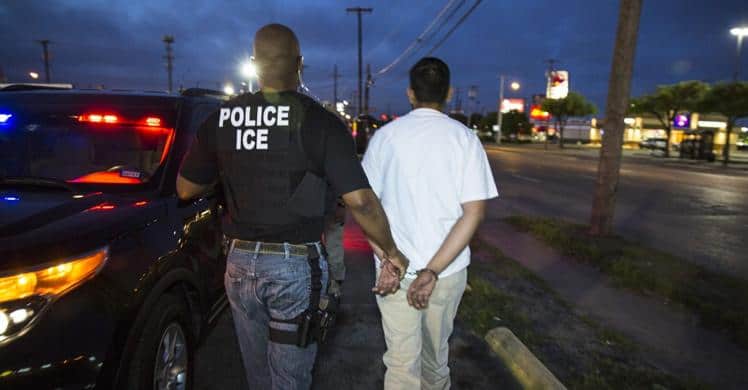Dial One if Your Neighbor’s Gardener Looks Mexican
Kavitha Surana, Foreign Policy, June 8, 2017

A U.S. Immigration and Customs Enforcement (ICE) program launched under Barack Obama to build trust with community groups has been reconfigured to focus on assisting victims of crimes committed by immigrants.
Twenty-one employees hired and trained to work in community outreach have been assigned to work under President Donald Trump’s new Victims of Immigration Crime Engagement (VOICE) Office, which was established in his Jan. 25 executive order on immigration.
The VOICE office provides services to help people track “removable criminal aliens,” a broad designation that could potentially apply to any immigrant eligible for deportation under federal law. The office is also tasked with publishing a quarterly report studying the effects of crimes committed by immigrants, and building partnerships with groups that assist people affected by immigration crime.
“They are being used to carry out responsibilities that they were not hired for,” Sarah Saldaña, the director of ICE from 2014 to early 2017, told Foreign Policy, adding that the original focus of the program “has been subverted to a focus that’s just political.”
The shift is another example of the Trump administration’s turn away from Obama-era policies, according to critics, who see the change as highlighting the agenda of Trump’s chief advisor, Steven Bannon.
{snip}
Saldaña, a political appointee under Obama, oversaw the expansion of ICE’s small community relations program in 2016. The initiative trained and placed a community relations officer in most of the agency’s regional hubs. The community outreach position was intended to serve as a point person to communicate about immigration enforcement, clarify specific raids and deportations, and explain ICE’s priorities.
“Their job was to go meet politicians, Congress people, advocate groups, and local law enforcement,” Saldaña said. “Let them see you as a person, as opposed to big, bad ICE.”
{snip}
The agency’s community relations work, based on tactics commonly used by law enforcement agencies across the country to build trust and gather crucial intelligence, has long been under attack by GOP hard-liners who cast it as a political tool of the left. In 2012, ICE tried to institute a public advocate, but House Republicans quickly eliminated the role, dubbing it an “illegal alien lobbyist.”
{snip}
But Saldaña maintains that before Trump’s election ICE was poised to greatly expand the outreach program and “remove the curtain” from immigration enforcement activities. Community relations officers were being trained to assuage fear in immigrant communities with facts about the agency’s priorities and activities.
Since 2014, ICE’s focus has changed to deporting violent criminals, gang members, and recent arrivals. Saldaña said this policy opened the door to building trust with a variety of community groups, encouraging them to report serious criminal activity.
About half of ICE’s staff focuses on investigations related to criminal activities such as human trafficking, child pornography, transnational gangs, and money laundering. They frequently rely on information from witnesses and informants, some of whom may not have legal status in the United States.
“I was trying to go out to the communities and explain: ‘We are interested in criminals, not in the family of four who has been here 40 years and has not broken any other laws,’” Saldaña said.
That didn’t happen, however. The community program expansion collided with the 2016 election, in which Trump ran a campaign that focused heavily on clamping down on immigration and highlighting crimes committed by undocumented immigrants.
{snip}
The program barely get off the ground before it was quietly altered. In a Feb. 20 memo, John Kelly, secretary of the Department of Homeland Security, directed that “any and all resources that are currently used to advocate on behalf of illegal aliens” be reallocated to VOICE, “and to immediately terminate . . . outreach or advocacy services to illegal aliens.” The community relations officer’s duties were shifted to the new VOICE office.
The VOICE office allows anyone to sign up for text messages and email notifications to track when an immigrant eligible for removal because of criminal activity is transferred to ICE custody, and when they are deported. A similar program was planned under Obama, but it ran into funding and privacy issues.
Under Trump, the program moved forward swiftly. “Any person who is affected by criminal activity allegedly perpetrated by criminal aliens in the United States” can use the system, according to the website. Users can register anonymously.
{snip}
As part of his Jan. 25 immigration executive order, Trump expanded deportation priorities to almost anyone in the country without legal status. “This is no longer an illegal alien-friendly environment,” Kelly reiterated at a Senate hearing on Jun. 6.
Though ICE doesn’t have enough resources to conduct mass deportation raids, the new policy means even people who have lived in the United States for decades and have never committed crimes are being deported if they come in contact with ICE.
{snip}
The new guidelines do leave one exception intact. Victims and witnesses who share information to help ICE investigations won’t be questioned about their immigration status.
{snip}















